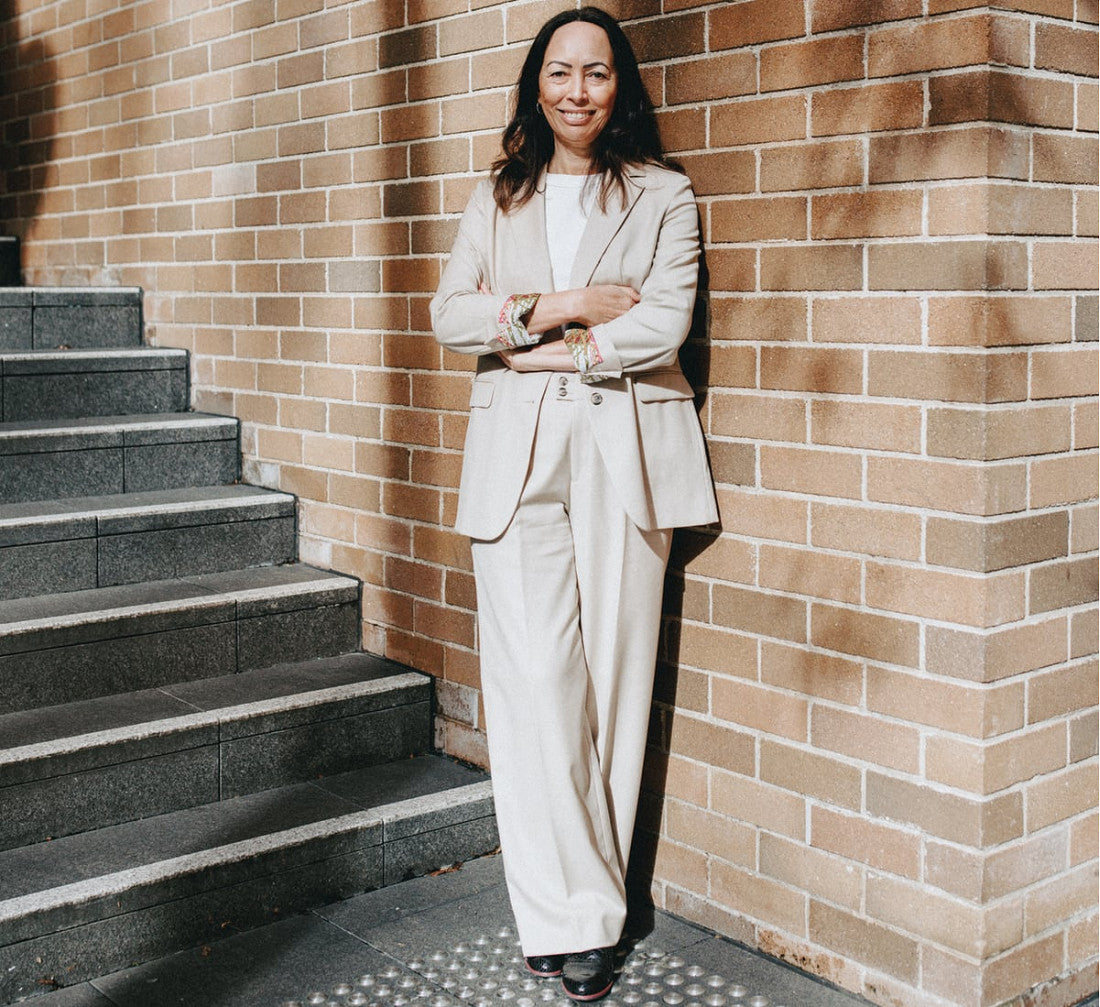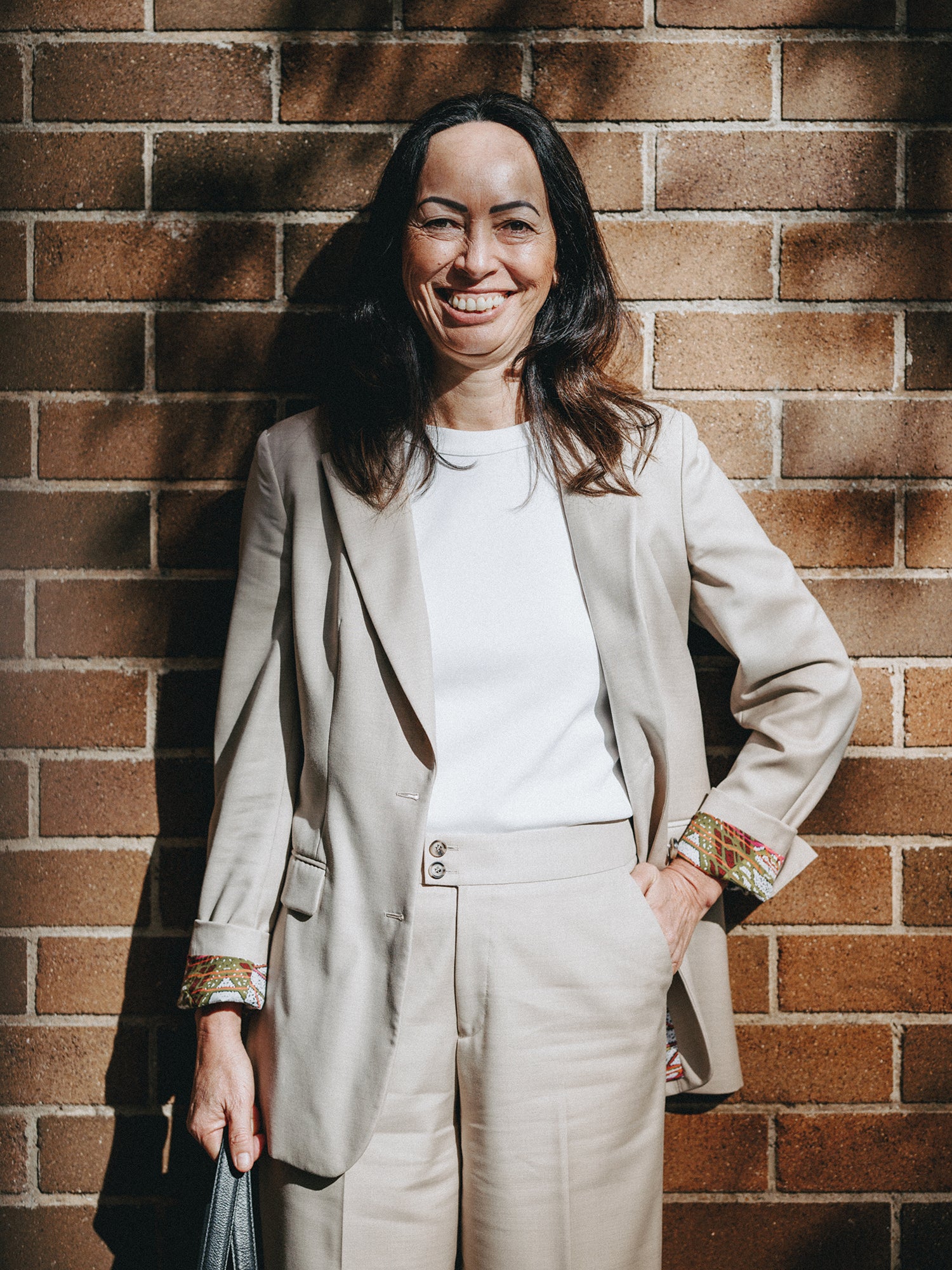Amity Guild x Oscar Hunt : Leah Armstrong
We are proud to partner with Amity Guild - a social enterprise promoting reconciliation strive through greater cultural understanding, truth-telling and celebrating success.
In celebration of NAIDOC week, our partners at Amity Guild sat down for a yarn with their latest ambassador, the inimitable Leah Armstrong.
Leah is a deeply experienced community and corporate leader with a background in the finance industry, an educator and a proud Torres Strait Islander woman, deeply committed to the amplification and growth of First Nation people and businesses.
In this interview, Leah shares - in line with this year’s NAIDOC Week theme of Get Up! Stand Up! Show Up! - the power of Indigenous business, her optimism for the future and the importance of active allyship from all Australians.

About Leah
My name is Leah Armstrong. I'm a Torres Strait Islander with ancestry from Boigu Island in Zenadeth Kes. I’ve been living and working in Newcastle on Awabakal Country now for about 30 years.
I'm currently the Managing Director and Co-Chair for First Australians Capital.
First Australians Capital is about supporting the growth of a thriving Indigenous business sector and we walk alongside businesses to assist them to become investment ready. We then look at investing in the businesses through our patient capital fund.

The power of Indigenous business
My uncles, my grandfather and my brothers have all run their own business and really been strong entrepreneurs. Growing up around that, I could see how business could support not only our family, but the broader community and give back to the community too.
My upbringing is why I believe the growth of Indigenous businesses is important because Indigenous Australians and their businesses go beyond just wealth creation for themselves. It is really about them being able to contribute back to community, contribute back to family. And for me it's also coming from growing up in an entrepreneurial family and seeing the benefits of economic independence.
Therefore, how can we create greater economic self-determination and economic justice for Aboriginal and Torres Strait Islander people who have been excluded from the economy since colonisation and start creating our own economic wealth? It's really important for us to achieve self-determination by actually having a strong economy supporting our own communities and our own families.
Impact through enterprise
I believe Aboriginal and Torres Strait Islander people are born into social justice and are also inherently social entrepreneurs – it is important for us to feel part of community, and that then has flow-on benefits from a cultural perspective such as us taking care of Country. It is our community, our Country and our culture that are important to us when we set up our own businesses - that's really what motivates us and drives us.
For us, [setting up a business] is about taking care of Country, taking care of our community, and that's underpinned by our cultural values.
Culture and how we demonstrate it is really important as it sustains us. It's those values that are important for us to live a full life. We should be proud of that. Aboriginal and Torres Strait Islander culture is the oldest living culture in the world so it's something that every Australian should embrace, and feel that it's part of their identity and bring it through into [all areas of our lives like] corporate board rooms.
Doing so really gets people thinking and starting conversations.
Towards a hopeful future
I think what's shifted and sets the foundation is that we are actually saying there's a really great and positive opportunity story in us talking about Indigenous Australia that's not about the deficit, about the gaps in our community and about trying to close the gap.
What I've seen in the last five years and why I am so optimistic and hopeful about the future is that in recognising that we have strength, we have power. We have the ability - given the right support, given the right opportunities - to access appropriate capital and, in doing so, Aboriginal and Torres Strait Islander people can become economic contributors.
This is not just for our own communities, but for the broader Australian community. It's that kind of innovation, social innovation and economic innovation that people are starting to take notice of. That's what, from what I've seen and heard in the last five years, has enabled that shift in optimism and hope.
I'm hoping in five years’ time, I'm actually no longer the Managing Director of First Australians Capital and that we have a thriving company and organisation with Indigenous leaders, and the next generation of Indigenous leaders who are leading this work that is building an impact fund that is going to contribute to growing a strong, thriving, economically independent Aboriginal and Torres Strait Islander community.
[From this] we can really look at how we can build a new economy in which Aboriginal and Torres Strait Islander cultural values and intellectual property is respected, integrated and valued.

Achieving economic justice
It's a really exciting time for Indigenous Australians, particularly from an economic perspective, where there are opportunities for us to contribute to the broader economy.
There’s also a real gap in the finance sector's knowledge and understanding about how to engage. That is something that First Australians Capital is seeing where finance drives economic outcomes and that the investor finance sector needs to be critically engaged in supporting Indigenous Australians to achieve economic justice, and build a broader Australian economy.
There is a real opportunity to get investors and finance people really thinking more broadly about what they're contributing in terms of addressing Indigenous outcomes and economic justice.
Australia has a really good reputation for doing things innovatively, certainly in the Indigenous and First Nation space without having any constitutional legislative frameworks that allows that. We are very good at social innovation and innovation to address these issues. We need the supporters behind us to do that. That's why we need the finance and investment sector to get on board.

The importance of allyship
Allyship is a really critical and important piece because we can't do this alone, and we need to have strong allies. I think it's important that non-Indigenous Australians actually get comfortable with truth telling and acknowledging the past - that's a given. It is the first thing that allies need to get comfortable with and get comfortable with having those tough conversations about the past.
It's not about feeling guilty - it's about actually acknowledging the truth and hearing the truth. For me, it’s also recognising that good intentions are important, but they shouldn't be a substitute for addressing justice and economic justice for us.
Aboriginal and Torres Strait Islander people are so giving in terms of knowledge, experience and learning. There is an opportunity available for non-Indigenous Australians to see their part in actually doing something that's going to make a tangible difference and stepping into the space with intentionality, and staying with it for the long haul - not just for a short period of time.
Being an Amity Guild Ambassador
It’s a wonderful story and the way the artwork considers the cleansing of the land, and that we’re not starting from the beginning, does capture the work that I've done in trying to sort of work within systems and change systems. This is whether it's through reconciliation movement or whether it's around the economic justice, self-determination and how we need to work within a system. It's not about saying ‘we need to start from scratch’.
I absolutely believe we've got so much strength in our communities. So how do we bring that strength to changing the systems? We change the environment, we change the way we engage. Aboriginal and Torres Strait Islander people are very good at adapting and we've had to, to survive. And that’s part of the land rebirthing and going through that.
It is ongoing, it is a constant approach to trying to build a better future for Aboriginal and Torres Strait Islander communities and the broader Australian population. It's about getting the environment right to build those trusted relationships, to change systems that allow Aboriginal and Torres Strait Islander people to achieve what they see as important to ourselves, it is a constant battle, it's a constant work in progress to work within systems in various ways.







